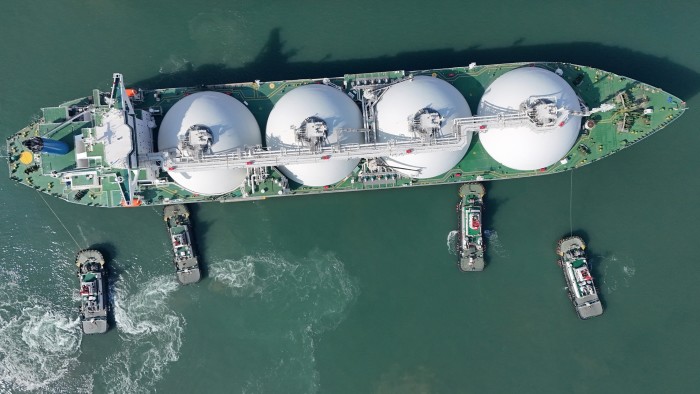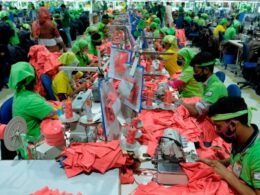Unlock the White House Watch newsletter for free
Your guide to what Trump’s second term means for Washington, business and the world
The liquefied natural gas industry has warned the Trump administration it cannot comply with new rules aimed at forcing them to use US transport vessels by imposing levies on Chinese-built ships docking at US ports.
It warns the rules published by US trade representative Jamieson Greer on April 17 could damage a $34bn a year export industry that is central to the president’s “energy dominance” agenda, according to lobbying letters sent by the American Petroleum Institute to the administration this week.
The new rules are part of US efforts to increase the pressure on China over what Washington argues are unfair trade practices, while boosting the domestic manufacturing of ships.
However, they have caused alarm among US exporters, who worry they will dramatically increase the cost of contracting vessels.
The LNG industry has already benefited from a three-year delay in the implementation of the rules to the sector, which is heavily reliant on Chinese and foreign-built vessels.
The USTR is also allowing LNG producers to gradually phase-in the use of US-built and flagged vessels over a 22-year period. US authorities could still order the suspension of LNG export licences if the terms of the new rules are not met.
But the API warns in letters to the US secretaries of energy and the interior that it is impossible for LNG producers to comply with the rules.
There are currently no US-built vessels capable of shipping LNG and no surplus capacity at US shipyards to build LNG carriers by the deadline of 2029, according to people briefed on the contents of the letters.
API warns the rules would compromise US producers’ ability to dominate the global LNG industry and cement America’s position as the global energy superpower.
This action against the industry could cause future US administrations to become creative and use similar trade instruments as a way to suspend export licences, the group argues.
Industry has also requested the administration exempt shipments of crude oil and refined products such as gasoline and liquefied petroleum gas from the maritime tariffs, noting such fees would disrupt a carefully balanced supply chain and hit industry competitiveness.
When asked about the letter, API told the Financial Times that it understood the need to curb discriminatory trade practices from China and increase US shipbuilding but had concerns about the rules.
“We will continue working with USTR and the Department of Energy in support of feasible and durable policies that benefit consumers and advance American energy dominance,” said Aaron Padilla, API vice-president of corporate policy, in a statement.
Charlie Riedl, executive director at the Center for LNG, an industry group, said the measures risk destabilising long-term contracts, raising costs for global buyers, and threatening America’s position as the leading LNG exporter.
“That’s why we have urged USTR to exempt LNG shipping and LNG carriers from this action entirely,” he said.
The US overtook Australia in 2023 to become the world’s biggest exporter, and last year shipped 11.9bn cubic feet a day of LNG — enough to satisfy the combined gas needs of Germany and France. The industry has ambitious plans to double exports by the end of the decade.
The new rules on Chinese-built, owned and operated vessels have sparked a wave of lobbying by US industry, including farmers and other exporters, who have warned it will push up freight costs.
Under the rules, the US will begin charging fees to vessel owners and operators from China of $50 per net ton beginning in 180 days, increasing by $30 per net ton over the following three years. Companies from elsewhere in the world operating Chinese-built ships would be charged a lower amount.
The oil and gas industry, which was a big donor to Trump’s election campaign, has so far enjoyed considerable success in winning concessions from the administration, including have oil and gas imports into the US excluded from tariffs.
Source link









